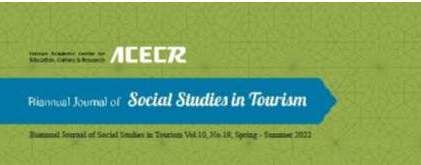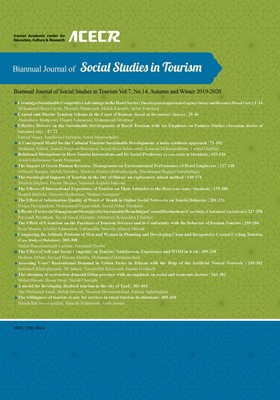Relational Disruptions in Host-Tourist Interactions and Its Social Predictors (A case study in Mashhad)
Subject Areas :Arash Ghahreman 1 * , Sareh Nematian 2
1 -
2 -
Keywords: tourist, host, social relation, relational disruptions,
Abstract :
This study investigated the disruptions of social relations among the tourists and the host. The statistical population included 676 citizens and domestic tourists, each a group of 338. A sample method, proportionate with the volume, was used to select the tourists. Cluster sampling was used to select citizens. To explain the main variable, we used regression and path analysis. To study the model based on the relationship between predictive variables and research structures and to determine the share of the weight of its construct dimensions, the study used structural equation modeling. SEM was also used to test the model, which had some variables with different influences. The results showed that in tourist-host social relations, the maximum was the intensity dimension, 44.17 (100-0), and the minimum was the symmetry dimension, 35.37 (100-0). In host-tourist relations, the highest mean was the dimensional relationship, and the lowest was the density dimension. In tourist-host relations, the results showed that 58.8% were very disturbed, 23.4% were in average disorder, and 17.7% were in a low and a very low disability. In the host-tourist relations, 86.7% were very disturbed, 8.3% were in average disorder, and 5% were in a low and a very low disability. Based on the results, a comprehensive program needed to develop for social trust and to promote its strategies.
استرایکر, شالدون و دیگران (1376). مبانی روان¬شناسی اجتماعی. ترجمه: جوادطهوریان. مشهد: معاونت فرهنگی آستان قدس رضوی.
اصغرپور ماسوله، احمدرضا ؛ صدیق اورعی، غلامرضا. (1389). «عدم توافق ارزشی و تاثير آن بر ناسازگاری زوجين در مشهد». مجله مطالعات ایران ،3 ، 85-64.
پاشا، غلامرضا؛ آتش¬پور، سیدحمید(1385). روانشناسی تعاملات بین فردی. تهران: جندی شاپور.
چاک، گی. وای. (1386). جهانگردی در چشم¬انداز جامع. ترجمه: سید. محمد. اعرابی. تهران: دفتر پژوهش¬های فرهنگی.
چلبی، مسعود. (1375). جامعه¬شناسی نظم. تهران: نشر نی.
خزائی پول، یاسر ؛ خزائی پول، جواد. (1391). «تحلیل تأثیر اعتماد اجتماعی بر تمایل به سفر مجدد به مقاصد گردشگری (مطالعه موردی: شهر ساحلی نوشهر)». اولین همایش ملی جغرافیا و گردشگری در هزاره سوم، نجف آباد، دانشگاه آزاد اسلامی واحد نجف آباد.
رازقی مله، هادی ؛ ابراهیمی، قربانعلی . (1397). «تحلیل رابطه علی سرمایه اجتماعی و توسعه پایدار گردشگری (مطالعه موردی: شهروندان شهر ساری)»، نشريه برنامه ريزي و توسعه گردشگري ، دوره 3، شماره 25، ص 71-46.
رهنما، محمد رحیم & خواجه زاده، ش. (1382). بررسی نيازهای خدماتی جهانگردان در شهر مشهد. مشهد: فرهنگ خراسان.
ساروخانی، باقر(1370). درآمدی بر دایره المعارف علوم اجتماعی. تهران: کیهان.
ساروخانی، باقر. (1373). جامعه¬شناسی ارتباطات. تهران: انتشارات اطلاعات.
گودیکانست، ویلیام (1383). پیوند تفاوت¬ها: راهنمای ارتباط کارآمد بین گروهی. ترجمه: علی کریمی و مسعود هاشمی. تهران: مؤسسه مطالعات ملی.
گیدنز، آنتونی. (1377). پیامدهای مدرنیت. ترجمه: م. ثلاثی. تهران: مرکز.
مزینانی، عادله ؛ فتحانی، محمدحسن . (1395). «اعتماد اجتماعی و امنیت فضاهای شهری در توسعه گردشگری». همایش ملی نگاهی نو به شهرسازی، امنیت و پیشگیری از وقوع جرم در فضاهای شهری، تبریز، شهرداری کلان شهر تبریز، دادگستری کل استان آذربایجان شرقی.
هزار جريبي، جعفر (1389). اعتماد اجتماعي و توسعه گردشگري. مطالعات و پژوهش¬هاي شهري و منطقه¬اي،دوره 2،شماره 7،ص 70-53.
يوسفی، علی. (1388). «اثرسفر زيارتي بر ارتباطات ميان فرهنگي اجتماعات شيعي». دفتر مطالعات فرهنگی و اجتماعی شهرداری مشهد.
یوسفی، علی؛ اصغرپور ماسوله، احمدرضا. (1388). «قوم¬مداری و اثر آن بر روابط بین قومی در ایران». دانشنامه علوم اجتماعی. دوره 1، شماره 1، ص 125-144.
Giles, h., & Coupland, n. (1991). Contexts of accommodation. new york: Cambridge University Press.
Ignatius, , E., & Marja , K. (2007). Factors contributing to verbal self-disclosure . Nordic Psychology, 59 (4), 362–391.
Jensen , S., Svendsen , G. (2016). Social Trust, Safety and the Choice of Tourist Destination. Business and Management Horizons , Vol. 4, No. 1, 1-9.
Moyle, b., Groy, g., & Weiler, b. (2010). tourism interaction on islands:the community and visitor social exchange. international journal of Culture, Tourism and Hospitality Reaserch, 4(2), 96-107.
Pizam, A., Uriely, N., & Reichel, A. (2000). The intensity of tourist-host social relationship and its effects on satisfaction and change of attitudes: the case of working tourists in Israel. Tourism Management, 21, 395-406.
Skipper, T. (2009). Understanding Tourist-Host Interactions and their Influence on Quality Tourism Experiences. Theses and Dissertations (Comprehensive). Paper 949. Retrieved from:Tourism Commons. http://scholars.wlu.ca/etd.
Strzelecka, M., Okulicz-Kozaryn, A. (2018). Is tourism conducive to residents’ social trust? Evidence form largescale social surveys",Tourism Review, https://doi.org/10.1108/TR-05-2017-0091..
West, R., & Turner, L. H. (2010). Introducing Communication Theory: Analysis and Application. Newyork: McGraw-Hill.

